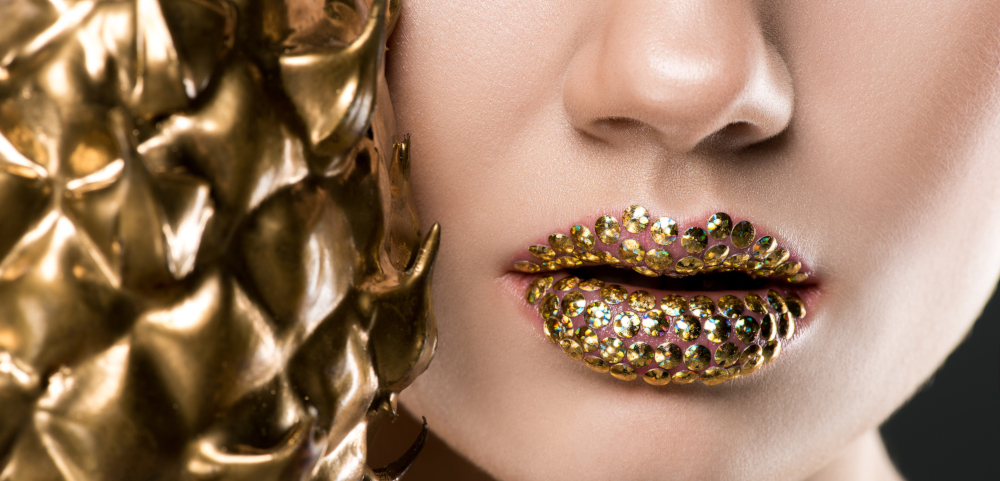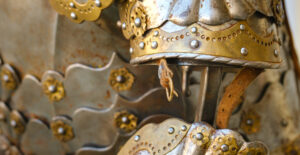
cropped view of woman with gild lips holding golden pineapple
In the back room of a small pawn shop in downtown Johannesburg, behind glass counters filled with old watches and second-hand cellphones, there’s a drawer that doesn’t get opened for just anyone. Inside that drawer are rows of tiny plastic packets, each holding something that looks like an ordinary tooth. Gold teeth, some whole, some broken, some still attached to fragments of dental mould. They arrive quietly, carried in by all kinds of people, older men, young women, even street traders. The gold tooth is an unspoken currency in South Africa’s quieter economic circles, a form of wealth that travels in pockets, wrapped in tissues or hidden at the bottom of handbags.
Unlike jewellery, gold teeth carry an unusual mix of value and story. A necklace can be bought and sold easily, a tooth feels different. It was once part of someone’s smile, part of how they showed themselves to the world. And yet, when times get tight, those same teeth find their way into pawn shops, jewellery resellers, or private buyers operating out of cars parked on the edges of taxi ranks.
This isn’t a business that draws attention. There are no street signs advertising gold tooth buying. Yet if you know where to look, markets in Durban, side alleys in Cape Town, Johannesburg’s informal trade networks, you’ll find it woven into the local economy like something ordinary and inevitable. Gold teeth in South Africa are part style, part practicality, part inheritance. In many communities, especially in older generations, having a gold filling or cap was seen as both a fashion statement and a show of financial status. It wasn’t just about dentistry, it was about walking through the world with something valuable literally built into you.
Today, that culture hasn’t disappeared. What’s changed is how those gold pieces circulate once they leave someone’s mouth. Sometimes it’s a matter of necessity. A family facing funeral costs. A young man out of work, trying to cover rent. An elder simplifying their life, selling off the last physical assets they own. The weight of a single gold tooth isn’t much, just a few grams, but multiply that across hundreds of quiet transactions every week, and it becomes its own kind of hidden economy.
The process is simple. A person walks into a pawn shop or arranges a meet-up through a trusted contact. The gold is weighed, the purity checked. Most dental gold isn’t pure 24-carat, it’s mixed with other metals to make it durable enough for everyday wear. But even at 14 or 18 carats, the price holds steady enough to make it worth the trip. Negotiations are usually quiet and quick. No receipts, no paperwork, just cash in hand and the tooth tucked away into one of those small plastic packets.
There’s a human tension to it. Selling a gold bracelet might feel like business. Selling a gold tooth is personal. It carries a sense of finality, of letting go. For some, it’s about moving forward. For others, it’s about survival. And on the other side of the transaction, there’s an entire network of people who handle these tiny, valuable items. Buyers sell to small refineries or larger gold dealers. Some teeth get melted down and turned into new jewellery. Others are held onto as-is, collected in drawers and safes, waiting for prices to rise.
 In some parts of South Africa, especially in townships where formal financial systems don’t always reach, gold teeth are even used as collateral in informal lending. A loan broker might hold onto someone’s gold cap as a form of guarantee, much like a watch or a phone. If the loan gets repaid, the tooth is returned. If not, it enters the quiet trade loop and is sold off.
In some parts of South Africa, especially in townships where formal financial systems don’t always reach, gold teeth are even used as collateral in informal lending. A loan broker might hold onto someone’s gold cap as a form of guarantee, much like a watch or a phone. If the loan gets repaid, the tooth is returned. If not, it enters the quiet trade loop and is sold off.
The stories that come attached to these teeth rarely get told. A cap that once sat proudly in an elder’s mouth becomes a melted lump. A tooth that shone in wedding photos disappears into a refiner’s furnace. But every so often, especially among smaller buyers, there’s a moment of pause before the metal gets weighed. Who did this belong to? How many smiles did it see? In Cape Town’s Bellville area, there’s a jewellery buyer who keeps a single gold tooth displayed in a glass box on his counter, not for sale, just as a kind of quiet emblem. It’s a way of acknowledging that there’s more to this trade than just weight and price.
South Africa’s gold economy is often talked about in big numbers, mines, exports, investment charts. But underneath all of that, there’s this slower, quieter layer where value is measured in grams and stories. The gold tooth trade isn’t flashy. It doesn’t make the news. Yet it’s part of how people get through difficult times, part of how wealth circulates in spaces where banks and brokers don’t always reach.
For many, holding onto a gold tooth until the moment it’s needed is like keeping a hidden savings account. Tucked away in a drawer, wrapped in cloth, forgotten until there’s no other choice but to cash it in. And for those handling the trade, it’s not just about profit. It’s about recognising the strange mix of personal and practical that comes with every small piece of metal passed from hand to hand.
It’s easy to miss these exchanges if you’re not looking for them. A man walking into a pawn shop with his hands in his pockets. A woman waiting in a car, a small packet resting quietly on the dashboard. But they happen, every day, in every city, forming a quiet thread through South Africa’s larger gold story, one smile, one tooth, one deal at a time.



